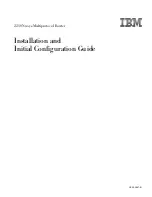
NetXtreme II
User Guide
January 2010
Bro a d c o m C o rp o r a ti o n
Page 52
Application Considerations
Document
ENGSRVT52-CDUM100-R
The same algorithm applies if a third and fourth backup operation is initiated from the backup server. The teamed interface
on the backup server transmits a unicast G-ARP to backup clients to inform them to update their ARP cache. Each client
then transmits backup data along a route to the target MAC address on the backup server.
Fault Tolerance
If a network link fails during tape backup operations, all traffic between the backup server and client stops and backup jobs
fail. If, however, the network topology was configured for both Broadcom SLB and switch fault tolerance, then this would
allow tape backup operations to continue without interruption during the link failure. All failover processes within the network
are transparent to tape backup software applications. To understand how backup data streams are directed during network
failover process, consider the topology in
. Client-Server Red is transmitting data to the backup server through Path
1, but a link failure occurs between the backup server and the switch. Because the data can no longer be sent from Switch
#1 to the Adapter A interface on the backup server, the data is redirected from Switch #1 through Switch #2, to the Adapter
B interface on the backup server. This occurs without the knowledge of the backup application because all fault tolerant
operations are handled by the adapter team interface and trunk settings on the switches. From the client server perspective,
it still operates as if it is transmitting data through the original path.
Figure 10: Network Backup With SLB Teaming Across Two Switches
















































